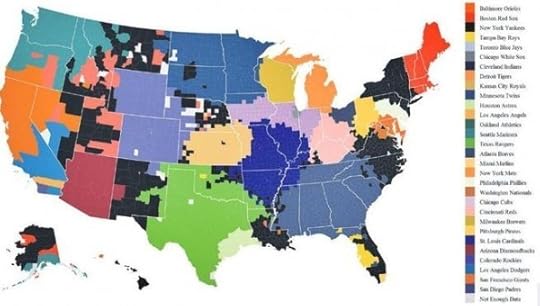Matador Network's Blog, page 2289
April 4, 2014
Don't make these travel excuses

Photo: martinAK15
I’m sure you’ve heard them before: Utterly incomprehensible travel excuses that keep people stuck in the same boring place for decades at a time, never experiencing anything but the cozy comfort of familiar surroundings and predictable leisure activities.
Sigh.
I will say some excuses are decent; it takes prioritization and potential sacrifice to build up the savings to travel, for example. I’d say it’s worth doing, and far less of a sacrifice than it may have originally seemed. But most travel excuses are just plain stupid. What’s even worse is those who stay home are often the ones for whom travel would be the most eye-opening. Scared of other cultures? Think travel is scary? Have no idea what people are like all over the world? Then you need to go!
It’s time for a little tough love, boys and girls. If you find yourself making these excuses, you need to get the fuck out. Get yourself a one-way ticket to Bangladesh with nothing but a teeny backpack and no plans of any kind and go have yourself a spectacular fucking time.
“Is it safe?”
Damn. If you actually think living at home is safe, you need a reality check. Depending on where you are, you may very well be in a country other people avoid because of how dangerous it is. This is especially true of those who live in the “greatest country in the world,” aka, the USA.
Ever take a look at crime statistics in the United States? Nah, I didn’t think so. You can probably cite all sorts of scary things that happened to Americans abroad, though. There’s that one guy in this one country. That other guy somewhere else. That one thing that happened that one time. Yeah, that’s totally a good reason to run away from reality.
Take a brief look at a list of countries with the lowest homicide rate, and you might make an interesting discovery. The United States is #104. Let that sink in.
Here are some countries with a lower homicide rate than the United States:
Laos
Suriname
Albania
Cambodia
Iran
Tajikistan
Slovakia
Qatar
Bhutan
If you’re afraid for your life, you should leave home as quickly as possible. Oh, and read this if you think hostels are scary.
“They don’t like Americans.”
Take a second look at that sentence. Is it a preconceived notion based on information other than having been there and experiencing it for yourself? Nice job! You just committed an act of prejudice.
What’s unfortunate about this particular sort of prejudice is it’s self-perpetuating. Once someone gets it into his or her head that “the world doesn’t like us,” they stay at home and never find out how nonsensical it is. Never mind that millions of Americans go traveling all the time and have a spectacular experience. Never mind that some places in the US treat minority populations like presumed suspects (ahem, Arizona). Once people think dumb things and shelter themselves from evidence to the contrary, it’s hard to get facts into their heads.
But I won’t bother arguing against that belief. It’s useless. I’ll merely point out that if you think the world hates Americans (or French people, or Italians, or whatever you may be), then it’s all the more reason to get out there and not be an idiot so people can see.
If they think Americans suck, go prove them wrong. Go somewhere and don’t suck.
“I don’t like how they do things there.”
Ah, yes, culture shock. Everyone’s favorite reason to stick it out in your home country and never experience anything else, all the while thinking your own set ways are somehow objectively superior.
It’s not often I meet people who encapsulate the American Dream, as I generally don’t associate with people whose only aspiration is buying a bigger house and accumulating a dozen business suits, but I’m occasionally reminded that they do, in fact, exist. People who “need” to buy things. Who “need” a new $400 purse. Who “need” a BMW. Who “need” to go tanning. People who think wants and needs are totally the same thing. These people often complain about not having any money. What a wonderful culture! But I digress.
It’s not that I think all ideas are equally valid; let’s face it, some ideas are just plain stupid. But if you’re afraid of other cultures, then you need to experience other cultures. You might actually learn a thing or two. You might learn that the best education on the planet is in Finland. That the longest life expectancy is in Japan. That the happiest country in the world is Norway. That Romania has waterproof, wrinkle-proof, rip-proof money that you can go swimming with. Why the fuck don’t we?!?! Oh, and in most countries, receiving a phone call is free. Only the caller has to pay.
Feeling jealous yet? If you think your culture is oh-so-great, I bet you haven’t seen much else. And that’s exactly why you should go.
“Don’t they have weird food?”
Yes, they do, and it’s fucking fantastic.
So yeah, this is a bit of a minor point, but still, people are extraordinarily terrified of what it’s like to eat in other countries. They have this weird picture of mangy rats on barbecue skewers drenched in the blood of slaughtered newborn children and garnished with wombat toenail clippings.
Ironically, the ones afraid of the food are probably devouring “food” that is cartoonishly unhealthy for them. One look at a week’s worth of food around the world should be enough to show just how much healthier food is supposed to be, and in other countries, usually is.
But I won’t try to convince anyone with the health aspect, because traveling for cuisine is absolutely spectacular. And this is coming from one of the world’s pickiest eaters, especially as a kid, who now gets super excited seeing all the wonderful concoctions the world has to offer. Oh, and street food is quite often the best food.
“I don’t think I can do it.”
Well then that’s why you should go!!!
Seriously, if you’re scared of how tough it’s going to be to travel around the world on your own, well, then your fears are getting the best of you. 18-year-olds with zero travel experience do it all the time, and they have an extraordinary time. Are you really going to let them be cooler than you are?
So if you’re scared of dealing with:
A weird language
Funny-looking currency
Crazy cultural oddities
Not knowing where things are
Only bringing a few pairs of shoes
Being alone
…then you need to go. If you can’t handle these (mild) life challenges, life is going to smack you in the face when real problems occur down the road. Like when your wifi goes out.
And it won’t even be as tough as you think. It’s probably going to be fun.
Now get out of here! 
This article was originally published at Snarky Nomad and is reprinted here with permission.
The post If you make these excuses, you need to get out and travel appeared first on Matador Network.

18 ways to piss off couchsurfers
Bungee jumper's worst nightmare-VID
THIS VIDEO taken in Zambia on Dec 31, 2011 doesn’t need any words from me. It speaks for itself.
In a recent post from The Guardian’s Experience section, Erin Langworthy recounts what happened:
I later found out I’d fallen for four seconds after the rope snapped: a distance of up to 40m. If I had been over land, I’d have been dead. Luckily, it had rained the day before, so the river was turbulent and full. That morning, I had seen crocodiles in the water, but I couldn’t think about that. I was struggling in the fast-flowing rapids, because my ankles were still tied together. The bungee cord had snapped near the top, so I still had about 30m attached to me, which kept getting caught. I was pulled downriver and underwater into whirlpools. At one point, the cord snagged below me and I was trapped below the surface. As I was running out of air and my vision started to fade, I managed to dive back down, grab the rope and pull it free. Eventually I managed to wedge my arm between two slimy rocks near the side of the river. All I thought about was clinging on.
I now know I was in the water for 40 minutes. The first guy to reach me was from the bungee company. He grabbed my harness and got me straight out of the water, giving me his shirt because I was shivering. I was worried that he didn’t have first aid training, so I got into the recovery position. Then I started throwing up water from my lungs. My body was purple with bruises from the impact. I started coughing up blood and began to worry about internal injuries. I felt exhausted and struggled to process what had happened.
I jumped at 5.30pm and didn’t get to hospital in Victoria Falls until 11pm. The paramedics got lost, and because I’d ended up on the Zimbabwean side of the river without a passport, I was essentially an illegal immigrant. I was put on a ventilator, and needed an ultrasound and to see a lung specialist. They gave me a large dose of antibiotics – the doctors were worried about how much dirty water I had ingested. X-rays showed no broken bones, but my lungs had partially collapsed. The guys from the bungee company visited me in hospital. They were very apologetic and astounded I’d survived. Facilities were basic, so I had to be flown to South Africa. Friends I’d met travelling got me my belongings and passport, so I could travel. Two weeks later, I went home.
Like any extreme activity, there are inherent risks involved. Hell, crossing the street is risky. So this is definitely not meant to scare anyone off doing this kind of activity. But sheesh! Hard to erase that imagery from your mind. Happy and safe adventuring everyone. 
The post Bungee jumper’s worst nightmare come true (Video) appeared first on Matador Network.

Notes from the night train

Photo: Jun Takeuchi
My grandmother called me the night before I left.
“Please don’t take the night train,” she said. I told her I might.
Later, she sent me an email: “My love, I know we spoke about the night train. If you do, and I know you will — because you crave adventure, maybe even more than I do — take my advice: Lock your backpack to the overhead, keep your passport in your pants, and, Carly, don’t forget to look out the window.”
Vienna à Rome
I spent the first four hours of the train to Rome alone in my couchette, gazing out the window at the sun setting over the Austrian Alps. I caught up on the last week of my trip, scribbling in a brown leather notebook I had bought from a vendor outside the Naschmarkt. My lock was abandoned somewhere in the hostel off Ringstrasse, so I slept on top of my backpack, with my passport tucked against the cool of my stomach.
Before midnight, I walked with sore, shaky legs to the dining car. Rows of cracked leather booths were all empty, so I ate a cold cheese platter with salted cashews, dried apricots, and a glass of tart red wine in silence.
When I returned to the cabin, a lanky boy in a soccer jersey, with stringy, almond hair, was perched on the cot across from mine, reading. I saw the cover — Kerouac, of course, in Italian.
“Ciao,” I said, with a self-effacing grin. “Io studiato in Fierenze. Inoltre, mi piace Jack Kerouac.” I reddened.
He humored me for a while, ignoring my clumsy grammatical errors and unending vocabulary requests. “Come si dice…?”
Eventually, my limited Italian had run dry, and the wine courage had faded. I feigned tiredness, closed my eyes softly, and lolled my head towards the train wall, let the boy from Bologna return to his book.
I awoke with a lurch to a stopped train, to his calloused hand resting on mine. He was crouched down, so close I could feel his breath on the tip of my nose.
“Ciao, bella,” he smirked, and with that, he left.
Split à Budapest
My shoulders were burnt, my cheeks freckled from weeks in the crisp Croatian sun. I had island hopped from the party of Hvar to quaint Vis, from a music festival on Zrce Beach to windsurfing the ultramarine waters of Bol. My back and midsection, hugged by my 62 L backpack, were soaked with salt from the mile walk to the station. Unstrapping and untangling the various bags and wet swimsuits hanging on my pack, I sat against the cool of the cement wall, waiting for the train to arrive.
I ate a spinach and cheese börek quickly, wiping grease from the filo pastry onto a small travel towel that had proved to be my most valued companion. The train to Budapest finally came, mostly on time. Semi-barefoot and knotted, I quickly found an empty cabin to recline in the cool of the air conditioning. There would be hours to read the books I’d put off, the writing I hadn’t done, so I closed my eyes for a moment as the remaining passengers filed on the train.
Suddenly, the glass door to my compartment flung open to the screams of girls in cutoff shorts and various neon-styled crop tops.
“CARLY!” they squealed in their lilting English accents.
It was obvious I was the only young American girl in the station, nervously set to board the night train.
I had previously met the girls at a hostel in Hvar, where we turned our small dorm room into a den of girl talk and makeup application, rolling on the floor with drunken stories of nights spent out at Carpe Diem, the infamous beach club a five-minute water taxi off the island. I borrowed their hair straightener, and they laughed at tales of the eclectic men I’d met traveling alone across Eastern Europe.
That night on the train, we reclined our seats flat until they joined, creating a massive bed for us to sprawl out on, legs intertwined. We read Cosmo UK magazines, ate chips with odd flavors like shrimp cocktail and curry — apparently very popular in Britain — gorged on Haribo candies and Cadbury chocolates. Passengers walking by peeked past the sandy pink sheet we hung up at the door to our cabin to find an old-fashioned sleepover party underway.
Months later, back at home in New York, I received a package from the girls loaded with odd chips and chocolates: “For your next party on the night train! Xx, your British girls.”
Delhi à Amritsar
The train from Delhi to Amritsar was different; it was the one my grandmother had warned me about. Sticky masses shuffled back and forth on the narrow platform, a chicken frantically crossed the train tracks. I stood in line for my ticket next to a bull lethargically waiting for his owner, and sat inside the station on the floor, next to a young family eating samosas. I received curious glares from mingling groups of Indian men — it was obvious I was the only young American girl in the station, nervously set to board the night train.
I smiled at the mother of the family sitting near me, and she beckoned me towards her. I slid my bags over, said hello. She wobbled her head, smiled. There was no mutual language to be spoken, except her offer of a potato and green pea samosa, still warm. I accepted readily. With no warning, the horns began to sound, with muffled announcements. Chaos as the masses of waiting passengers herded outside towards the arriving train. I spotted the young backpacking Austrian man I’d seen in the ticketing line and filed in behind, following him to the first cabin on the right.
We sat and smiled at each other, slightly relieved to find familiarity in one another. Soon after, the door to the cabin slid open, and three Sikh men in turbans slipped in quietly. As the train left the station, they began to converse with one another, casually, curiously glancing at the two of us on the other end of the cabin. We ate our dinner of daal and chapatti, and the Austrian quickly fell asleep. One of the three men reached into his bag, as I looked for something in mine to keep occupied. From the depths of his side pocket, he gingerly pulled out a fresh deck of cards, and the Indian men began to play.
Looking up, I smiled broadly, and hesitantly asked (unsure if they spoke English, unsure if they wanted to speak with me), “Do you all know how to play gin?”
“Of course!” they laughed at my clear trepidation.
We spent the next several hours playing cards, on that night train to Amritsar. I learned they were Punjab government officials, and that they were better at cards than I was. They spoke to me about the sacred Golden Temple and their families in Delhi. Each was curious about what I was doing backpacking alone in India, asked me questions with skeptical delight. The train ride passed quickly, and soon we were disembarking in the subdued light of the Amritsar station.
The next morning, at sunrise, I visited the Golden Temple. I watched the sun come over the building, reflected in the water below. I listened to the Sikh chants and felt grateful — for my grandfather teaching me gin, for girl talk, for samosas, for love without language, for cool concrete walls and reclining bulls, for the opportunity to see the world and learn its variety, and most of all — for the night train. 
The post Notes from the night train appeared first on Matador Network.

31 crazy camping tricks
We’ve entered the age where ‘glamping’ is a thing. Glamor camping, for those who mercifully had not heard about it till now, is a type of outing where one sleeps less under a tent and more in a fully appointed home that just happens to be under a canvas roof.
Though the glamping trend feels a bit too much like the One Percent’s approach to the outdoors, glampers do have a point: This is the 21st century, and there’s no reason we need to treat camping like we’re still cavemen. Here are some camping hacks to make your trip less chaotic and, hopefully, more enjoyable.
1. Protect your toilet paper.
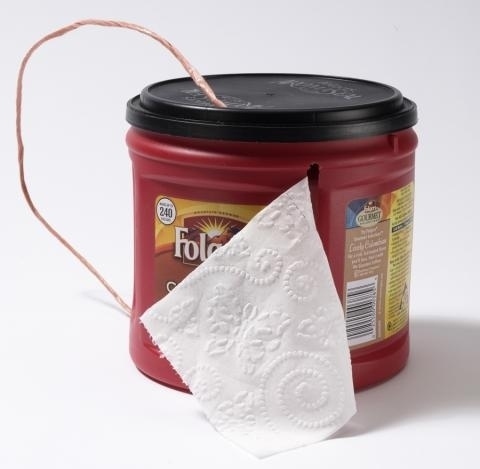
(via)
A super easy hack that can keep your toilet paper from being crushed and keep it from getting wet if you accidentally drop stuff in the water or if it starts to rain. Just take a coffee can (my father’s been using cylindrical Quaker oatmeal tins for years, and they work just as well), pop the TP in, and cut a slit in the side to run the paper out of.
2. Create a makeshift lantern.
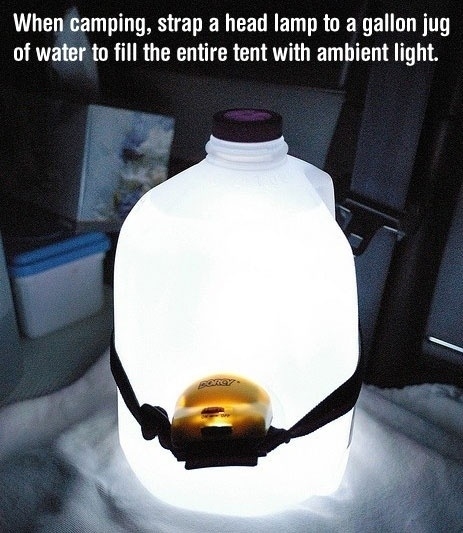
(via)
You’d be surprised how much light it provides. They actually use old soda bottles as solar light bulbs in some parts of the world.
3. Make a makeshift glowstick.

(via)
Keep the bottle ¼ of the way full with Mountain Dew, sprinkle in a little bit of baking soda and three capfuls of peroxide. You’ve just made a glowstick.
4. Create a makeshift music speaker.

(via)
You don’t need to bring big speakers or even a separate speaker plugin for your phone: A phone or an iPod in a ceramic mug will work just fine.
5. Sage is a natural mosquito repellent.
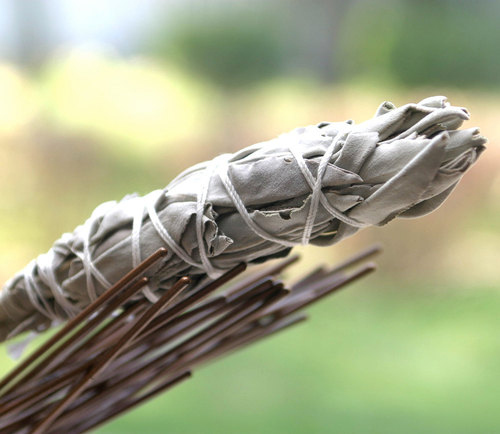
(via)
Throw some on the fire every now and then, and it should help keep them away.
6. Spice that shit up.
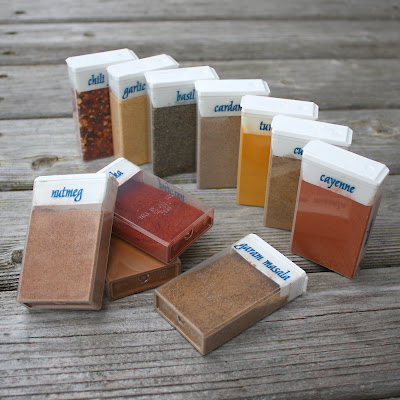
(via)
There’s no excuse for bland food, even in the middle of the woods. Use Tic Tac containers.
7. Pack a cooler like a boss.
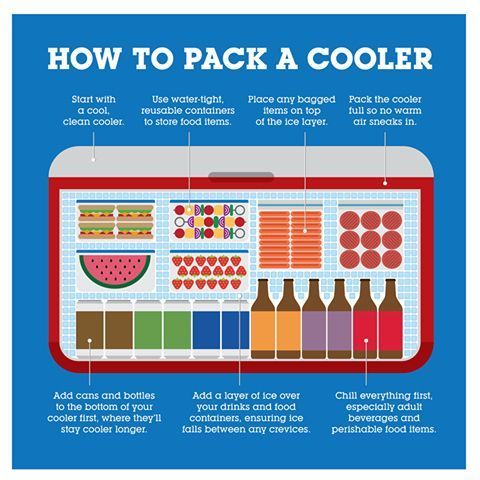
(via)
The more space you conserve, the more room there is for beer and hot dogs.
8. Pack a backpack like a boss.
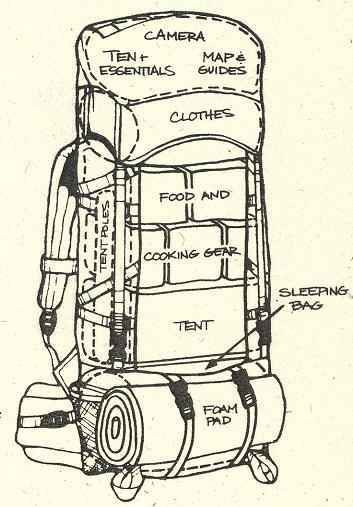
(via)
If you’re gonna be moving, pack efficiently.

More like this: 1 trick that will change the way you pack forever
9. Keep your clothes warm.

(via)
Especially if you’re camping in the winter, you can keep your clothes warm by putting the next day’s clothes in your sleeping bag while you sleep.
10. Use Doritos as tinder.

(via)
While it probably doesn’t say anything great about the nutritional content of Doritos, they actually work pretty well as kindling if, say, it just rained and you’re having trouble getting a fire lit. You can also use the lint from your laundry dryer’s filter.
11. Make coffee easy to make.

(via)
Just put some coffee in a coffee filter, tie it up with dental floss, and then use it as a teabag in hot water.
12. Conserve (and don’t lose) soap.

(Via)
It sucks if you drop your one bar of soap in the lake and have to root around the bottom to find it. So, instead, get a bar of soap, peel it up with a vegetable peeler, and use a single slice per bath.
13. Make your zippers more zippable.

(via)
Just put a keyring on them. This is especially useful if you’re camping in cold weather and are wearing gloves or mittens.
14. Bring quick and dirty firestarters.
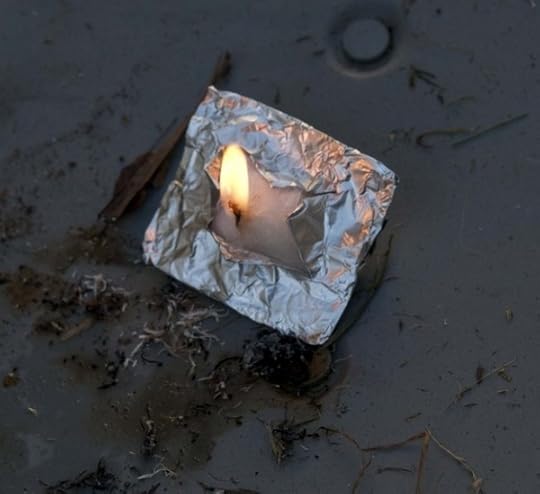
(via)
If you don’t want to burn through a billion matches, do this: coat a cotton ball in Vaseline and then wrap it in a square of aluminum foil. When it’s time to use it, cut an X in the foil, pull a bit of the cotton out, twist it into a wick, and light it. It should last about 10 minutes.
15. Pack more firestarters.

(via)
It’s just circular cotton pads dipped in wax.
16. Bring Altoids tiki torches.

(via)
Take an empty Altoids tin, fill it with folded cardboard, and then sprinkle wax on top.
17. Carry a portable charcoal grill.

(via)
Charcoal in a cardboard egg carton. Light the carton. Fire started.
18. Protect your matches.

(via)
Wooden matchboxes can get wet or crushed. Pack your matches in a plastic container — make sure they’re ‘strike anywhere’ matches — and then glue some sandpaper to the top of the container. If you’re camping in the cold, bring a metal tin, as the plastic might break.
19. If you’re body-odor averse, bring a portable washing machine.
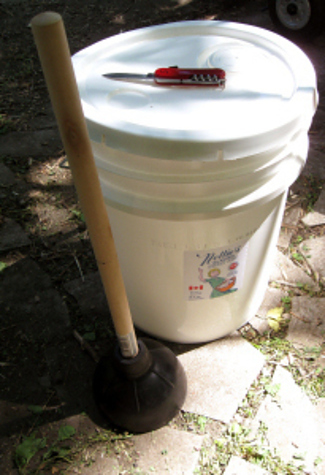
(via)
Basically, just get a five gallon bucket, cut a small hole in the top of it, and then put some water and detergent in it, stick a regular bathroom plunger through the hole, toss the clothes in, and use elbow grease. More detailed instructions here.
20. If you’re squat-in-the-woods averse, bring a portable toilet.

(via)
A milk crate, a bucket, a toilet seat. Boom.
21. Hide your valuables in soap.

(via)
Especially if you’re at a fairly crowded campground and want to go for a hike, valuables can be hidden in soap. This is an old Boy Scout trick.
22. Make calzones.

(via)
Mini calzones in cupcake tins. Can be cooked directly over the fire.
23. Make campfire cones.

(via)
Fruit and chocolate, grilled in aluminum. What’s not to love?
24. Smoke it with rosemary.

(via)
A nice alternative to a marinade — just put it directly on the charcoal and underneath the meat.
25. Roast Starbursts.
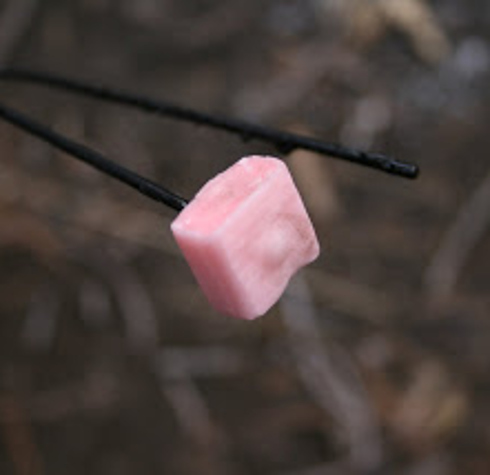
(via)
You heard me.
26. Seriously, guys, you can cook virtually anything in foil.

(via)
Three cheese potatoes. Burgers. Sausage. Lumberjack breakfast. Pineapple upside-down cake. Nachos. All in foil.
27. Pre-make your pancakes.

(via)
You won’t have to worry about spoiled milk or eggs if you pre-make your pancake batter, put it in plastic bags, and then freeze them. They’ll double as ice packs, and you can thaw them and then cook them up.
28. Cook all your hot dogs at once.

(via)
If you don’t have a grill and want to cook all your hot dogs at once, all you need is a rake.
29. Never lose your keys in the water again.

(via)
Attach your keys to a cork. Practically essential if you’re boating.
30. Get comfy with padding.
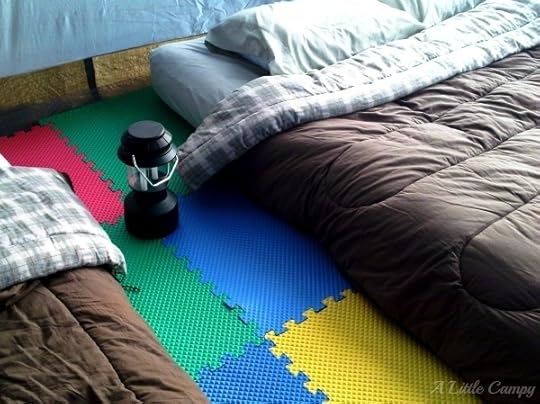
(via)
It’s way easier on the back to camp with padding between you and the ground. If you don’t want to buy these tiles, a yoga mat will work in a pinch.
31. Know your knots!
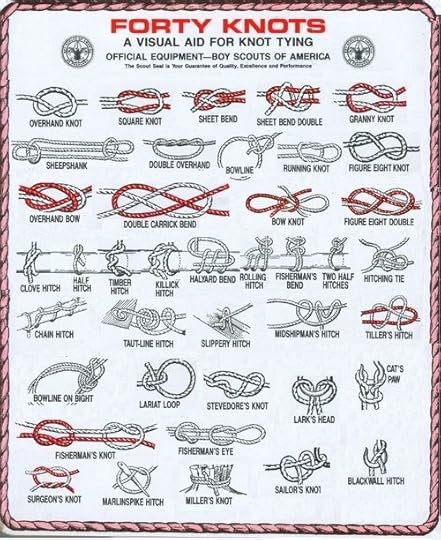
(via)
As any Boy Scout knows, knots aren’t a one-type-fits-all deal. Learn a few, and it’ll make your camping (and your life) easier. 
The post 31 crazy camping tricks that will make your life easier appeared first on Matador Network.

April 3, 2014
10 reasons to keep a travel journal

Photo: nahlinse
1. Because memory is a slippery bugger.
When I was 31, I backpacked alone through Vietnam without a journal. I’d recently purchased a pricey camera, so I enthusiastically snapped hundreds of photos, never bothering to write down a word. Not surprisingly, what I retain from that trip are imprecise memories and a shoebox filled with slides of people and places I can no longer name. Furthermore, because I traveled solo, I can’t even poach my friends’ memories for missing details. In short, I didn’t bother asking myself what I’d want to remember and what I’d likely forget.
When traveling, we assign more significance to our experiences than we do to the happenings of our daily life. That outlook, along with our tricked-out digital camera and its generous memory card, instills a false sense of confidence about how much we’ll retain. Out on the road, life is so electric, jazzy, fresh, and funky — how could we ever forget? But we do. We forget, and then we hate ourselves later for mistreating our own memories.
No matter how unique, powerful, outrageous, or touching our story, the mind’s flimsy hard drive simply cannot be relied upon to safeguard the particulars. But a journal is personal travel insurance, protecting our memories from strolling off unchaperoned, vanishing without a goodbye or backwards glance. This is the driving force behind most people’s road journals, and although basic, its importance cannot be overstated.
2. There’s no better keepsake than a tattered notebook.
Journals get tucked away in drawers or basements to be dusted off years or generations later and enjoyed for the tactile sensation that only an old, beloved book can deliver. Nothing can replace a road-worn journal filled with scribbles, coffee cup rings, doodles, and bus tickets.
Years from now, when your journal unexpectedly finds its way back into your hands on a day when you have time to open it, it’s time travel — a complimentary door-to-door shuttle delivering you back to your most fearless and fascinated self, when you were out roaming, eyes wide open, connecting to the world and its people, tracing the journey within the pages of your messy notebook. It’s more than a collection of words; it’s a personal artifact.
3. Because you need an anchor.
Any way you look at it, travel stirs us up. It’s a stimuli smorgasbord with a menu of curiosity, frustration, self-consciousness, bliss, courage, vulnerability, stress, alienation, titillation, fear, loss, boredom, lust, loneliness, awe — you name it. And in addition to emotions, we’re perpetually absorbing information and sensory phenomena. But a notebook is a traveler’s salve, soothing the commotion of our relentless thoughts by providing a safe container for them. The act of writing anchors us, slowing and deepening our reflections so that we articulate with more honesty and precision than when we think and talk. To my mind, this is the ultimate reward of a travel journal: being forced, routinely, to slow down and pay attention.
Journaling demands stillness and extreme concentration. If we set aside even a few minutes a day to sit with our notebook and write about where we are and what we’re currently experiencing with all our senses, it becomes a practice. It frees us from thinking only of past and future — the site we’ve just visited or our next destination. We can let go of hopes and fears as we bring attention to this moment, then the next, and the one after that. Over time these brief, disconnected moments of awareness form a cohesive thread, a solid habit of increased mindfulness that can carry over into all areas of life.
4. And a sacred space to call your own.
When we travel solo, a journal keeps us company. Conversely, traveling with others means we get our fair share of camaraderie but routinely forfeit our privacy. We double up on rooms, rides, meals, and lavatories; share maps, gear, and dry socks. But your notebook is private property. You won’t be asked to lend it out. It can thus become a haven, a sacred oasis to come home to when travel has thrown you off-kilter — a personal traveling shrine or altar where you commune with only you.
5. Journaling is a profound vehicle for self-discovery.
While any journal is a portal to expanded awareness, the travelogue is an unparalleled avenue for self-discovery. Paired with the myriad rewards and ordeals of travel, it can solicit breakthroughs that other journals simply cannot. Travel tilts us off our axis and enrolls us in a crash course in cutting through desire, attachment, aversion, and ignorance.
On the road, we’re in constant flux — it’s an impermanence free-for-all. Leaving home demands that we surrender control, break out of cozy routines, and confront inconvenience and obstacles (travel’s ever-present entourage) around each corner. We’re continually forced to reassess our entrenched beliefs, as well as question social and cultural concepts we’ve grown up accepting as appropriate and normal — from the way we discipline children, to what constitutes breakfast food, to how we bathe, shake hands, and clothe ourselves. Keeping a journal while navigating the discoveries and obstacles that come with travel is a rare and extraordinary opportunity for growth.
6. You might need that odd bit of information.
On the most basic and practical level, a travelogue is a vault of information that you wish to preserve — the name of that historic hotel in Livingston, Montana, the artist you discover at the Uffizi Gallery, the family you bunk with in Tunisia, or the location of a dreamy holistic spa in Jamaica. A journal can store practical info that you want to remember but not necessarily share with your blog readers or email list.
Some photographers keep journals of locations, film, and camera settings, while chefs store recipes and lists of ingredients in their journals to reference later. If you’re a detail hound, you can even begin a table of contents on the first page to be filled in as you go. It’ll be painless to find information later, such as favorite restaurants, inns, shops, campsites, or spas you want to recommend to fellow travelers (or better yet, return to yourself).
7. It’s the world’s best writing exercise.
In Fresh Air Fiend, Paul Theroux commented, “When people ask me what they should do to become a writer, I seldom mention books. I assume the person has a love for the written word, and solitude, and a disdain for wealth — so I say, ‘You want to be a writer? First leave home.’”
Travel has the ability to make writers of us all, and keeping a journal is what can turn the potential into reality. Throw yourself in the mix and you’ve got the winning trifecta: Travel supplies endless material and inspiration, the Travelogue provides a canvas and demands commitment and examination, and you, the intrepid and attentive Traveler, are the prime candidate for the position.
One of travel’s great benefits is that once we cross a border, we needn’t even seek out creative inspiration — it’s everywhere. We step off the runway and within hours find ourselves surrounded by plants and flowers we don’t recognize and animals we’ve seen only in zoos or on TV. We interact with people who speak only words we can’t understand, observe customs contrary to our own, pay for exotic trinkets with Monopoly money, eat unidentifiable food. For some, this can be unsettling. For the writer, it’s a windfall.
8. “Elsewhere” is a place creativity grows.
Pablo Picasso said, “All children are artists. The problem is how to remain an artist once he grows up.” That problem, I think, can be solved with travel. Travel renews our youth, giving us dispensation to reclaim the original zest for art so often rooted out of us as adults. Surrounded by the unfamiliar, we regain the eyes of a six-year-old, and suddenly we’re handed all the conditions necessary to become an artist again: inspiration, free time, a portable canvas (the journal), and a cornucopia of exotic materials at our disposal. Can you think of a better environment for revamping your creativity?
Infusing your notebook with visual components is more than a pleasurable, relaxing activity with a visual payoff; the act of doing so also immediately intensifies your connection to a location, adding another layer of self-awareness and expression. By deciding to include artwork of any kind, you’re signing on to register impressions in a new way — with keen observation. When you return home, accompanying you will be a dynamic hybrid journal that interweaves writing and imagery — a tribute to your experience and destination.
9. A shared journal can help you connect.
If you’re traveling with a friend or spouse, creating a shared journal can bring you closer and foster a sense of unity. The upshot of this is multifold: First, by sharing the goal of a travelogue, you’re more likely to commit since you’ll be loath to flake on each other. Furthermore, when you’re not feeling the writing vibe, he or she may be — you’ll egg each other on. Knowing you’ll be sharing your words will also up the ante, adding zing to your writing. One more bonus is that you’ll no longer rely strictly on your own mind, so when your memory falters, your friend might provide insight into the circumstances that led to you falling off your camel in Giza or your barstool in Berlin.
If you’re in a group, you can create a feeling of community by starting an “open” notebook that members of your group can contribute to at any time. At trip’s end, photocopy it for everyone or create a separate album with pictures, quotes, names, inside jokes, highlights, and lowlights. Even if you and your friends are together 24/7, you bring to the book distinctive perspectives. You’ll appreciate accessing their take on shared experiences, and you’ll learn from these secondhand impressions. Ultimately, your friends’ stories will inform your own.
10. It’s a wonderful outlet for handling travel stress.
Travel isn’t always easy; sometimes it can completely derail you. On these occasions, the journal can be your lifeline, something solid and steadfast to grab hold of in the midst of upheaval. When feelings of homesickness, powerlessness, frustration, or fear wiggle their nasty little fangs into your erstwhile perfect vacation, you can draw strength and comfort from writing — using your journal as a refuge and a reminder of how resilient you are and how courageous you want to be. If you start losing your temper (or sense of humor), you can call on your journal to help you find it again. That’s what it’s there for. Your journal will help you cope, like a portable therapist. You might even find you can be more honest with your notebook than with your therapist. 
This post is excerpted from Writing Away: A Creative Guide to Awakening the Journal-Writing Traveler and was originally published here.
The post 10 reasons to keep a travel journal appeared first on Matador Network.

Off the beaten track in Vietnam

Photo: United Nations Photo
“What have you been doing?” I asked my guide after he arrived an hour late to go for dinner.
“Drinking,” was his short, slurred answer. With a challenging stare he dared me to comment. I merely nodded and suggested we find something to eat.
We were in a small Degar village in the central highlands of Vietnam, on the third day of a four-day motorcycle trip. I had met Anh on the streets of Nha Trang, where I told him I wanted to escape the pretty picture presented to the bucket-guzzling backpackers and see the country for what it truly was. Anh promised to show me the ‘real’ Vietnam.
He was a quiet, brooding man, but a good guide. He knew the roads perfectly, pointed out sights I wouldn’t otherwise see, and answered my questions before I asked them. The only criticism was that every night he got blind drunk. That day he started drinking at 4pm. While I explored the village, Anh had aimed for oblivion with rice wine. I was hungry, tired, and sore from the day’s riding. I wanted to eat and go to bed.
The first place we went was shut. We moved on and heard a ruckus coming from a stilted hut to our right. It was far from the road but the din was strong and promised the type of scene Anh was looking for. We climbed a ladder fashioned from a log and stood at the entrance. Inside were about 40 men. Some sat on benches along the edges of the room, drinking brown rice wine from glass Coca-Cola bottles. Five very large ceramic jugs of rice wine were set in the center of the room, with other men drinking from them through bamboo and plastic straws. The men were of all ages, the youngest teenagers smoking hurriedly, sitting on the floor on the outskirts of conversations. They barely noticed our appearance at the doorway, apart from one villager, who welcomed us.
We found an open space in the corner and sat down on the floor. The man who greeted us brought over two bottles of the murky rice wine.
“Anh, can we eat here?”
“Yes, but later,” he said to me curtly.
“When?” I asked. He ignored the question, talked with the man, and then turned to me. “This is a special Vietnamese wedding. You should feel lucky to experience the culture. People pay thousands of dong for such a unique experience!”
“This is a wedding?” I asked, stunned.
It didn’t look like a celebration. The people’s clothes were third-hand and in tatters, except for one man in a black and gold collared shirt who Anh explained was the groom. The bride was cooking in the kitchen with the other women. This swayed me, and I tried to explain I was happy to be there, just hungry. “You need to go to the army,” he told me disapprovingly. “Would you rather be with your friends at a full moon party? Or here seeing this? Do not get angry. Come, drink more.” All of this was garbled and spat out.
Now I found myself in the kind of unique situation I proclaimed to be so desperately after, and I had second thoughts.
I took a deep breathe and considered his questions. I looked around slowly again and noticed the side glances and muted conversations. I realized we were in fact not welcome at all. It seemed like we were intruding, and Anh, in his intoxicated state, was oblivious.
Anh talked to the man who had welcomed us. He disappeared and returned with a bowl of rice, fruit, and sauce. As he crossed the hut, every head turned and watched the food. A salivating hush descended. Judging by the looks, everyone was just as hungry as I was. As the food was placed in front of us, I looked up to see every face heavy with envy — some of the drunker ones were incensed. One older man shouted something that shattered the silence.
“What did he say?” I whispered to Ahn.
“I don’t know. I don’t speak his language. Eat,” he told me.
Slowly the men returned their focus to the conversations and drinking. Others displayed their outrage by shooting over cruel glances between sips of rice wine. Anh dished up the food and gave it to me. I was so hungry I decided all I could do was eat. After one small bowl my head immediately felt clearer. Anh didn’t touch his.
“Why aren’t you eating, Ahn? Eat,” I told him.
“I’m not hungry. I’ve already eaten.” I just looked at him. I was too exasperated to argue.
As I ate, I started to perceive the villagers differently. They didn’t appear to be as malicious as I initially discerned. They were rightfully skeptical of outsiders, especially on such an auspicious occasion. I realized we deserved to be treated as the intruders we were.
I had a long sip of wine and considered the night. The allure of this motorbike trip was to see the raw, uncensored Vietnam. Now, it seemed, I found myself in the kind of unique situation I proclaimed to be so desperately after, and I immediately had second thoughts.
It occurred to me that the romantic allure of off-the-beaten-path travel was different to the reality. I had been thinking of this trip for years and in my dreams created an illusion so grand it would be impossible to live up to. My imagination only included the glory of adventure and discovery and never any discomfort or harsher reality. Two weeks into my seven-month journey through Asia, and I was already second-guessing myself. Maybe I would be happier at a full moon party.
We drank more of the rice wine, and I felt better, less anxious. Eventually the food was brought out, which Anh told me was dog meat. When our rice wine was finished, Anh decided it was time to leave.
The next day as we rode out of the village, I was left with a hangover and the persistent question of how I should have managed the situation better, and if I really did want to persist with this line of travel. As the rice fields and mountains slipped by and we got further from the village, I cheered up. Further from the questions that the previous night had posed and closer to Nha Trang, where I would be able to return to familiar comforts, similar people, and indulging in those buckets. Relieved to return to the very things I initially wanted to escape. 
The post What happens when “off the beaten track” isn’t where you really want to be? appeared first on Matador Network.

Yankees are the #1 baseball team
MAJOR LEAGUE BASEBALL season officially started this week in the USA. While it may be the most boring sport on earth, I enjoy the occasional excuse to be drunk for three hours, and cheer on my home team. I used to think New Yorkers were biased towards the Yankees, as they are pretty much the greatest team ever (the Mets are fine, but have been a long-running joke for most of us), but apparently, everyone else legitimately thinks so too.
In places that don’t have a state baseball brand, it’s easy to root for a team that has won the World Series 27 times — but I wonder if Yankee fan distribution is so widespread, because New York has one of the highest move-out rates in the country. 
H/T NBC 4 New York.
The post This map proves that the Yankees are America’s #1 baseball team appeared first on Matador Network.

31 sure signs you're from Florida

Photo: Ricardo Mangual
Today I live in a drought-suffering desert over a mile above sea level, but I was born and raised in a place that’s exactly the opposite of that: central Florida, cultural nexus, land of Southern mindsets without the Southern charm. If you’re a native Floridian too, you probably already know what that’s like.
1. You know the joys of hush puppies.
No seafood joint’s menu is complete without this Gulf Coast delicacy. My New Yorker brother-in-law, after trying them in my hometown’s canal-side upscale seafood restaurant, later asked, “Can we get more of those fried balls of dough?” That about sums it up.
2. You know the joys of Yuengling.
The nation’s oldest brewing company is actually distributed across the East, and if you grew up in Florida, you know it as the king of the upper-bottom-tier gas station beers.
3. You know there are three Floridas.
NoFlo (no one calls it that) is basically southern Georgia/Alabama. SoFlo (ditto) is northern Cuba/DR/South America and a retirement abyss. CenFlo (ditto) is a confused a-cultural region where all the tourist stuff is.
4. You’ve never paid for entry into theme parks.
Trust me — there’s always a way.
5. You know Gatorland, Cypress Gardens, Reptile Land, Dinosaur World, etc.
Florida was once bustling with a charming array of minor theme parks adults would try to convince you were just as cool as Disney when you were a kid. Some of them actually were.
6. You only occasionally care about Florida pro sports that aren’t basketball.
Even then, most people still don’t care about the Heat unless they’re from Miami, the Magic ditto Orlando. Otherwise, every Florida pro sports fan abides by a rollercoaster relationship with their teams: You love the Marlins until the Yankees gut their young talent, you pretend to care about the Dolphins on Sundays, you forget we have hockey teams, and no one watches the Jags.
7. Crazy-things-that-happened-in-Florida lists don’t surprise you.
I’ve read the last few years’ worth of these from Buzzfeed and thought they were funny in a quaint, nostalgic kind of way. I even went to high school with somebody on the list, and another who should have made the list after making CNN for getting his arm bit off by a gator.
8. You can’t breathe in higher altitudes.
Florida is practically below sea level. If you’re a native Floridian and have tried running up and down hills or hiking mountains, you suddenly realized what asthmatics must feel like.
9.You know where crocodiles come from.
No, there are no crocodiles in Florida. There are, incidentally, lots and lots of Crocs.
10. You don’t notice sweat.
In July in Florida, you can walk to your car, grab the phone you left in there, and come back inside to see fresh pit-puddles on your shirt when you pass the mirror. If you hadn’t seen it, you never would have known.
11. You’re just a little bit Southern.
Even the ones like me who moved off and eschew Southern-ness still at least crave BBQ, own shotguns, and obsess over the football teams of schools they didn’t attend.
12. You know Universal is way, way better than Disney.
When you grow up taking annual field trips to theme parks, you figure out after you’re like seven years old that unless you’re a girl who still wants to be a princess, Disney World kind of sucks. Everyone wishes they could go to Hogwarts, though — I don’t care how old you are.
13. FSU v. UF is the biggest rivalry in sports.
It doesn’t matter what part of Florida you’re from (well, maybe not way south) — your life was at some point in some way affected by the country’s biggest redneck football rivalry.
14. You know the Tampa shit-hole paradox.
Tampa is one of the more interesting cities I’ve ever been to, mostly because it’s a total shit hole while also being cool in a cousin-with-a-weird-social-disorder-who-makes-funny-jokes-about-your-uncle kind of way. This is also the anomalous sports city, and the only place you’ll find actual Rays, Bucks, or Lightning fans.
15. You think Tampa is a joke.
Everyone from Florida eyes Tampa with the skepticism with which they’d buy street food in an Asian island country. However, Tampians will defend their city like the parent of a highly spoiled and deeply idiotic child: You don’t understand — that’s just how he is.
16. You know where to find carnies in the off-season.
Gibsontown and Valrico are infamous carnie haunts. Wondering where you might find them? You guessed it, right by Tampa. (Non-Floridians, are you getting the idea about Tampa yet?)
17. You’ve had thong tans on your feet.
I personally hate flip-flops, but a lot of people wear them 12 months out of the year in Florida, giving them a lovely big-toe farmer’s tan.
18. You know Dexter was definitely not shot on-location.
There are not nearly enough armpit stains in Dexter’s long-sleeved shirts.
19. You’re okay with swimming anywhere there’s water.
Canals, ditches, ponds, lakes, oceans, retention ponds, reservoirs, swimming pools — you name it, most Floridians have swum it. Whether they lived to tell about it isn’t always a given, though.
20. A landfill qualifies as a hill.
NoFlo (again, no one actually says that) actually has hills since it’s basically, as stated, southern Georgia/Alabama. For the rest of us, colossal mounds of waste have to suffice.
21. The idea of snow tires is absurd.
You actually have to change your car tires for just a few months out of the year? Why do you even drive?
22. You have no idea what a radiator is.
I live 2k miles away now, and I still don’t know.
23. You have no idea what the Polar Vortex is.
Again, I still don’t know.
24. You say ‘up north’ and still refer to the South.
Sometimes this applies even after you move to a different region. I’m pretty sure I’ve said it while living in the Southwest to refer to South Carolina.
25. Turning on the heat just means turning off the AC.
In the in-between temperatures this might also entail opening the doors and windows, depending on your proximity to standing water.
26. You didn’t know your feet could get cold.
I went to see my sister in NYC in December one year with only a pair of Toms. I coped by doubling up on socks and walking in place.
27. Your thickest jacket is a flannel.
I have two winter coats: the one I got to visit my sister in 2009 and the absurdly bulky leather jacket my dad used to wear in the ’80s when he lived up north (Maryland).
28. 60 degrees is cold.
Mom: “It’s going to get down to 60 today. Better take your heavy flannel!”
29. You’ve been to Orlando for some reason other than tourism.
Concerts, college, conferences, field trips, internships, a job, just passing through…I personally lived there for five years (four for college), and I can tell you even the majority of people who live there moved there for a reason.
30. Long-distance travel gives you phantom E-Pass/SunPass syndrome.
Toll roads are a way of life in Florida. After moving away, I still sometimes feel like I’m doing something wrong if I’m not paying money just to drive on a highway.
31. You know the ‘secret’ to removing love bugs from your car.
Soapy water and dryer sheets, according to my mom. (Does driving through a cloud of love bugs remind anyone else of the Millennium Falcon entering hyperdrive?) 
The post 31 signs you were born and raised in Florida appeared first on Matador Network.

Skiing Powder Mountain, Utah [vid]
Day 1
We arrived at Powder Mountain just in time. The road was still open and lifts still spinning after 6” the night before. Hungry for powder, we didn’t even stop for groceries on the way up — this would turn out to be a bad decision, as the storm was just setting in. We met up with good friend and Marketing Director at Powder Mountain, Patrick Lundin, who guided us into the goods for an awesome first day. Little did we know, the lifts would not be turning for the rest of our time at Powder Mountain Resort.
Day 2
Awakening to the deep rumbling of avalanche control after a night of howling wind against our small mountainside condo, we geared up to find out what was going on. Good friend Kyle Clancy just barely managed to squeak up the road to join us before it closed for the day, along with the chairlifts. Luckily, the Summit Series folks were also snowed in and out in force for a day of catskiing. They kindly let us in on the action, and we lapped some awesome low-angle tree runs all day long.

Watch more: What it looks like to ski the greatest snow on Earth
Day 3
Deja vu, except this time we’d run out of the bacon and oatmeal we’d salvaged from the ski lodge freezer. The cats weren’t running, the road was still not open, and the 4+ feet of snow outside the condo had incapacitated almost every car in the parking lot. As ski patrol worked hard to mitigate the avalanche danger, we messed around on snowbank side-hits, adventured out on splitboards and powsurfers, and watched our fair share of Olympic ice skating.
Day 4
The three-day blizzard we called “PowMageddon” was clearing, and the hordes of powder hounds were finally let up the road, but our appetite for a fresh meal and new scenery got the best of us. As the first chairs were being loaded, we were on our way down the road to what would be an all-time bluebird day at neighboring Snowbasin. Fresh blue air and light blower snow made for an amazing day on what’s perhaps the best kept secret in Utah.
After four solid days in the midst of Northern Utah’s biggest winter storm, we needed no more convincing of why they call it the Greatest Snow on Earth. 
 This post is brought to you by Utah, home of The Greatest Snow On Earth®. With 11 ski resorts less than an hour from Salt Lake City International Airport, there’s plenty of powder for the perfect ski vacation.
This post is brought to you by Utah, home of The Greatest Snow On Earth®. With 11 ski resorts less than an hour from Salt Lake City International Airport, there’s plenty of powder for the perfect ski vacation.
The post Powder Mountain ski mission: Waist-deep in Utah’s finest appeared first on Matador Network.

Matador Network's Blog
- Matador Network's profile
- 6 followers



